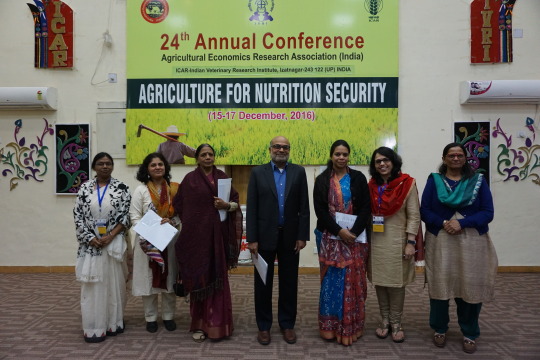Engendering food systems for improved nutrition

TCI-TARINA and the International Food Policy Research Institute (IFPRI) co-hosted a special session, titled “Engendering Food Systems for Improved Nutrition,” at the Agricultural Economics Research Association’s 24th Annual Conference on December 16th, 2016. The primary objective of this event was to initiate a discussion about linkages between gender, agriculture, and nutrition.
The session included panel speakers from various national and international research institutes and focused on two overarching themes – (1) crop diversification and technological choices for engendering agriculture, and (2) behavior change among women for improved nutrition. Papers presented at the session covered a range of topics, including women’s labor and time-use in agriculture, crop choices by women in welfare programs like the Public Distribution System (PDS), and the role of extension services and self-help groups (SHGs) in enhancing women’s income and nutrition. Key findings presented during the session are summarized in detail below.
Women’s decision-making, labor, and time-use in agriculture
Studies have shown a growing trend of feminization in Indian agriculture. This is primarily driven by increased out-migration of men seeking employment opportunities elsewhere, while women are left to take care of farms. Despite their growing role in agriculture, women still are not usually recognized as farmers and their involvement in decision-making on various agricultural activities is very limited. Lack of access to information, new technology, credit facilities, and proper training often hinders women’s decision-making capacity.
The amount of time that women devote to labor-intensive agricultural activities and work outside the home can have serious implications for their own nutritional status as well as the nutritional status of their children and family members. Thus, enhancing women’s access to low-cost mechanization is essential to reduce their drudgery and time spent in the field. However, evidence suggests that even when mechanization is introduced, women’s drudgery or their total time allocated to farm activities is not reduced. This is largely due to the fact that mechanized activities are typically taken up by men, leaving the more arduous manual tasks to their female counterparts.
Women’s empowerment and behavior change for improved nutrition outcomes
Empirical evidence shows that household consumption patterns, and mainly that of women in the household, change during times of crisis and uncertainty. Women tend to prioritize the elderly and children before themselves during food shortages caused by household income variability, seasonality of food availability, or other factors. Thus, it is important to enhance the affordability of nutritious foods by increasing their year-round availability and by raising the purchasing power of households.
Improving women’s access to income as well as their control over land, assets, and credit were highlighted as critical pathways to enhancing food and nutrition security. However, information asymmetries often limit women’s ability to harness the potential of agriculture, as they are often deprived of the appropriate technological know-how and knowledge about inputs and best agronomic practices. Poor attention paid to female farmers by extension workers at the ground level, along with cultural and social barriers that discourage women from interacting with male extension workers, contribute to information asymmetries.
Although higher incomes help improve household food security, increasing the quantity of food available at the household level does not always guarantee an improvement in nutrition, since nutrition depends more on diversity and quality of food consumed. For this reason, enhancing women’s understanding of nutrition and why it is important to have a nutritious and diversified diet, as well as encouraging behavior change towards self-consumption are critical to achieving positive nutrition outcomes. Women SHGs have been instrumental in educating and empowering women to catalyze behavior change and to increase their income and economic opportunities.
Overall, the session concluded that there is an important tradeoff between women’s labor and time-use in agriculture and family nutrition. However, labor-saving technologies targeted toward women can help reduce both their drudgery and time spent in the field. Additionally, women SHGs are a powerful agent of change. And, lastly, enhancing women’s skill and knowledge through extension systems is a prerequisite for increasing their decision-making capacity and income, which lead to better nutrition outcomes.
To watch the full video coverage of this event, please click here.
By Surabhi Mittal
Surabhi Mittal (sm2638@cornell.edu) is the Coordinator of TCI’s TARINA Center of Excellence, based in New Delhi, India.




